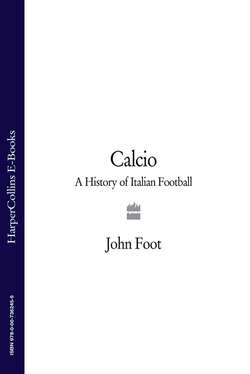Читать книгу Calcio: A History of Italian Football - John Foot - Страница 16
Running the Game. The Italian Football Federations. Splits and Reunions
ОглавлениеWe have seen that the first Italian football federation had been formed in 1898 and had organized the first championships, which slowly expanded from the minor one-day tournament of that year. In 1909 the federation changed its name to the FIGC (Federazione Italiana del Giuoco del Calcio) making calcio the official Italian term for football. That year also saw the adoption of a rule book and federal statutes. Referees were also brought under the auspices of a special commission. For the first time, relegation and promotion were introduced.
Almost from the beginning of the history of calcio, the ‘problem’ of foreign players produced heated debate. The early championships saw teams with English, Belgian, Swiss and German players in key positions. Genoa and Inter were often criticized for their preponderance of foreign players. In part, this was simply jealousy, but politics was also important. Italian nationalists argued that the domestic game should be reserved for Italians.
In 1908, the football federation took a radical step – all teams with foreign players would be excluded from the main championship and a special competition would be reserved for them. In protest, a series of big teams pulled out altogether, including Milan, Torino and Genoa. The foreigner ban was seen by the Milanese clubs as a crude attempt to take their power away, on and off the field. Milan were particularly angry as their chance of winning the special Spensley Cup, awarded for three successive championship victories, had been removed by diktat.
Under pressure again, after the farcical failure of the Italian-only championship, the federation re-admitted foreigners the following year, but the issue continued to provoke bitter debate. A gesture was made towards Milan, who were awarded the Spensley Cup without having actually won it. In 1910, Inter’s championship victory was marked by controversy over the role of Aebi, an elegant Swiss-Italian player whose citizenship was called into question. These battles were also over territory (the head offices of the football federation kept shifting from city to city, and in particular between Milan and Turin) and about control over what was becoming big business. The world of calcio was, right from the start, riven by splits, controversies, rivalries and acrimonious debate. It was rare for a championship to go by without insubordination by one club or another and the federation struggled to impose its authority.
